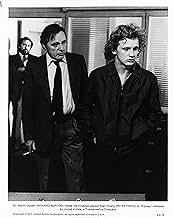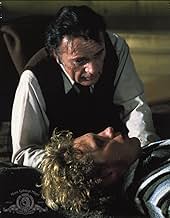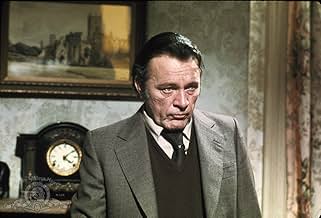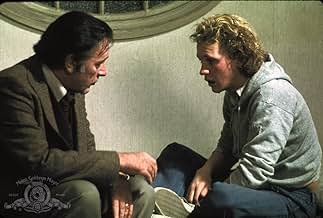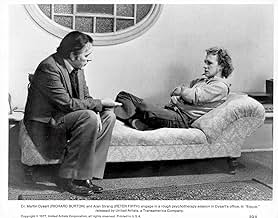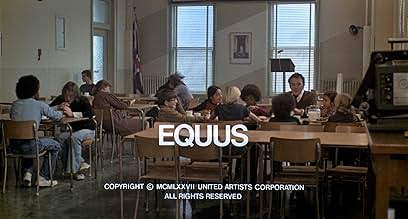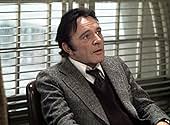Richard Burton credited as playing...
Martin Dysart
- Martin Dysart: Moments snap together like magnets forged in a chain of shackles. Why? I can trace them, I can even with time pull them apart again. But why at the start were they ever magnetized at all. Why those particular moments of experience and no others, I do not know! And nor does ANY BODY ELSE! And if *I* don't know, if I can *never* know, what am I doing here? I don't mean clinically doing, or socially doing, but fundamentally. These whys, these questions, are fundamental. Yet they have no place in a consulting room. So then do I? Do any of us?
- [last lines]
- Martin Dysart: But, now, for me, it never stops. The voice of Equus. Out of the cave. Why me? Why me? First, account for me. How can I? In an ultimate sense I cannot know what I do in this place, but I do ultimate things, irreversible things. And I, I stand in the dark with a blade in my hand, striking at heads. I need, more desperately than my children need me, a way of seeing in the dark. What way is this? What dark in this? I cannot fully ordain but God! I cannot go so far! I will however, pay so much hardship. There is now in my mouth this sharp chafe. It never comes out.
- Martin Dysart: That's what his stare has been saying to me all this time: 'At least I galloped - when did you?'
- [first lines]
- Martin Dysart: Afterward he says, they always embrace. The animal digs his sweaty brow into his cheek, and they stand in the dark for an hour, like a naked couple. And of all nonsensical things, I keep thinking about the horse, not the boy. The horse and what he might be trying to do. I keep seeing the huge head, kissing him with its chained mouth, nudging from the metal some desire absolutely irrelevant to fulfilling its bearing or propagating its own kind. What desire could this be? Not to stay a horse any longer, not to remain reigned up forever in those particular genetic strengths. Is it possible that at certain moments, we can not imagine, the horse can add its sufferings together, the nonstop jibs and jabs that are its daily life, and turn them into grief? What use is grief - to a horse? You see, I'm lost.
- Martin Dysart: All right! The normal is the good smile in a child's eyes. There's also the dead stare in a million adults. It both sustains and kills, like a god. It is the ordinary made beautiful, it is also the average made lethal. Normal is the indispensable murderous god of health and I am his priest.
- Martin Dysart: You have a special dream?
- Alan Strang: No. You?
- Martin Dysart: Yes - what was your dream about last night?
- Alan Strang: Can't remember - what was *yours* about?
- Martin Dysart: I said the truth!
- Alan Strang: That *is* the truth. What was yours about, the special one?
- Martin Dysart: [matter-of-factly] Carving up children.
- Martin Dysart: The thing is, I'm wearing that horse's head, myself. All reigned up in old language and old assumptions, straining to jump, clean hoofed onto a holding track of being, I only suspect is there. I can't see it because my educated, average head is being held at the wrong angle, I can't jump because the bit forbids it. My own basic force, my - horsepower - if you like, is too little.
- Dora Strang: Alan always adored horses. In fact, we've always been a horsey family. Well, my side has. My uncle used to ride every morning on the downs behind Brighton, all dressed up in a bowler hat and jodhpurs. He used to look splendid. Indulging in equitation, he called it. I remember telling Alan how that word came from equus.
- Martin Dysart: Equus?
- Dora Strang: The latin word for horse. Alan was absolutely fascinated by that word, I know. I suppose, because he'd never come across one with two "u"s together before.
- Martin Dysart: What do you do now?
- Alan Strang: Touch him.
- Martin Dysart: Where?
- Alan Strang: All over. Belly. Ribs. His ribs are of ivory - with great value. His flank is cool. His nostrils open for me. His eyes shine. They can see.
- Martin Dysart: She sits and knits things for orphans in some home she works with and I sit opposite turning over the pages of books on mythical Greece. Mentally we're in different parts of the world. She's forever in some drizzly chapel of her own inheriting and I'm in some Doric temple, clouds tearing through the pillars, eagles baring prophecies out of the sky. She finds all that repulsive. All of my wife has ever taken from the Mediterranean, from that whole vast intuitive culture, are four bottles of Chianti to make into lamps and two china condiment donkeys labeled Sally and Pepe.
- Martin Dysart: Go on, what then?
- Alan Strang: Sugar.
- Martin Dysart: Lump sugar?
- Alan Strang: The last supper.
- Martin Dysart: Last before what?
- Alan Strang: Ha, ha.
- Martin Dysart: You say anything when you give it to him?
- Alan Strang: "Take my sins. Eat them, for my sake."
- Martin Dysart: Go on, ahead, mount him.
- Alan Strang: "Into my hands, he commends himself. Naked in his jingle jangle. Equus. Equus! Equus! Take me!"
- Martin Dysart: I wish - there was somebody in this life I could show - one, instinctive, absolutely un-brisk person that I could take to Greece and stand in front of certain shrines and sacred streams and say, "Look, life is only comprehensible through a thousand - local gods." Not just the old dead gods, with names like Zeus; but, living geniuses of place and person. Not just Greece, but, modern England. Here. Spirits of certain - trees, of certain curves of brick wall, of certain fish and chip shops, if you like, and slate roofs and frowns in people, slouches. I'd say to them, "Worship! All you can see. And more will appear."
- Martin Dysart: I'm talking about passion, Heather. Do you know what that word meant originally? Suffering. The way you get your own spirit through your own suffering. Self-chosen. Self-made. This boy's done that. He's created his own desperate ceremony just, just to, just to ignite one flame of original ecstasy in a spiritless wasteland around him. Alright. He's destroyed for it. Horribly. He's virtually destroyed by it! But, one thing I know for sure, that boy has known a passion more ferocious than I have known in any second of my life. Let me tell you something, I envy it!
- Martin Dysart: Three weeks a year, in the Mediterranean. Every bed booked in advance. Every meeting paid for with vouchers. Cautious George and hired cars. Suitcase, crammed with kaopectate. What a fantastic surrender to the primitive! And the primitive, I use that word endlessly. Ah, the primitive world, I say, what instinctual truths were lost with it?
- Martin Dysart: When Equus leaves, if he leaves at all, it will be with your intestines in his teeth - and I don't stock replacements.

